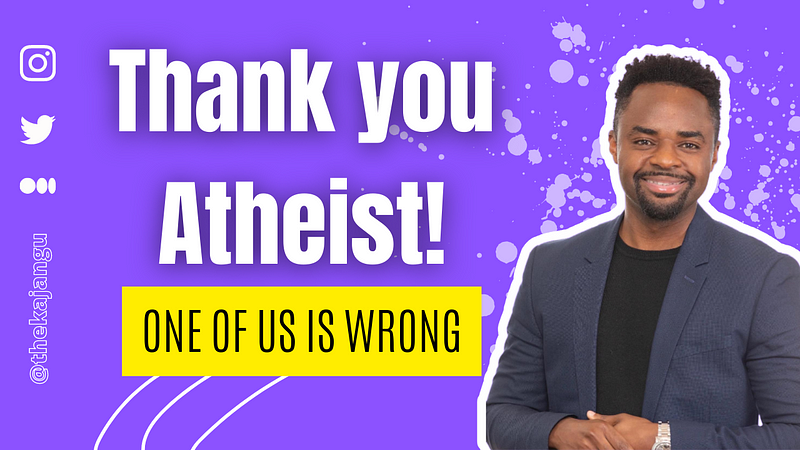Exploring the Intersection of Faith and Atheism: A Thoughtful Dialogue
Written on
Chapter 1: The Nature of Belief
Thank you for your perspective, atheist; one of us must be mistaken. It is implausible for everyone on this planet to be incorrect about their beliefs. Nature itself illustrates the principle of duality: for every ascent, there is a descent; for every right, a left; and for every error, there exists a truth.

Illustration by the Author (designed by Max Schwb)
Approximately 7% of the world's population identifies as atheist, individuals who either disbelieve or lack belief in a deity or deities. The remaining majority hold various beliefs regarding a higher power (a general estimation by sociologist Phil Zuckerman).
Engaging in a debate about the existence of God may seem unnecessary. The natural laws reveal the existence of opposing forces—positive and negative—that can lead to reactions. When considering the existence of a creator, it’s evident that one viewpoint is accurate. Most lean towards the affirmative, while some lean towards denial. If one perspective holds truth, it is reassuring to know that there is something rather than nothing.
There is a notion that atheists may possess more faith than some theists. Faith, by definition, is belief without empirical proof and an unwavering trust in a concept or entity. An atheist, in this sense, exerts considerable faith in the idea that everything is random. Picture a superhero endowed with immense powers yet insisting that these abilities are illusory and insignificant.
No one can assert they are innately an atheist or a person of faith. There comes a pivotal moment of choice. Our surroundings greatly influence our beliefs; initially, we adopt the values of our communities. As we encounter diverse experiences, we can either modify our beliefs or remain steadfast in our original path. A middle ground is typically not an option.
Where lies your value system?
It is not problematic for someone to assert that there is no God, but challenges arise when they must propose an alternative moral framework.
The Russian novelist Fyodor Dostoyevsky articulated this poignantly:
“If God is dead, then everything is permitted.”
Let us entertain the assertion of atheists that there is no God. What then? How shall we navigate our lives? Who shall we turn to for guidance? And how do we address the innate longing for something greater that humanity has sought for centuries?
If we were to all embrace atheism, the questions would multiply rather than diminish. In the absence of an ultimate authority, who will hold power? Humanity or their systems? History teaches us that human governance can be perilous.
If you cannot offer a more substantial argument, it might be wise to stay silent. A foundation built upon what doesn’t exist is bound to collapse eventually.
How should we approach atheists?
They represent a segment of humanity seeking truth through empirical observation as their sole means. Why limit ourselves to one method when numerous approaches are available? Engaging in endless debates may not be fruitful. Instead, we should extend compassion through our actions and strive to practice love to the best of our abilities.
If the deity we believe in is all-powerful and omniscient, then only such a being can sway atheists, possibly through us as conduits of the message. Meeting others where they are has proven more fruitful than attempting to forcibly convert them to our ideologies.
Three questions for all atheists:
- Can you devise a framework for humanity to lead a meaningful existence?
- Can you outline a strategy for individuals to achieve their best selves?
- Can you propose a method for addressing our differences?
If you cannot provide reasonable solutions that can unify us, please avoid disparaging others' beliefs by focusing on the flaws of religion as justification for its abandonment. Just as you have highs and lows, it is certain you would not appreciate being judged solely on your failures.
These fundamental questions have been addressed by some of history’s greatest thinkers, yet their answers have not been compelling enough to dissuade humanity from belief in a creator.
Chapter 2: Reasons for Distrust in Religion
There are myriad reasons one might harbor resentment towards religion. The sheer number of groups raises questions about which are right and which are wrong. Additionally, the divisions within similar faiths contribute to this distrust. If we were to replace religion with other established organizations, we would still encounter disagreements and schisms. This illustrates that regardless of the group, human beings are naturally inclined to differ in opinion.
We would hope for a unification among religions around a singular truth. However, historical attempts at such unity have often ended poorly. As long as we exist, there remains the potential for learning from past mistakes and forging a better path forward. Without such endeavors, our progress would be stunted.
For believers, placing faith in something may seem like a gamble, yet atheists remind us that opposing views indicate the presence of a correct path.
In this compelling video, "Atheist Changes His Mind After One Simple Question," we witness a powerful moment of introspection and reevaluation of beliefs.
The second video, "Terrible Reasons Not To Be An Atheist," challenges viewers to reflect on common misconceptions and encourages a deeper understanding of faith and belief.